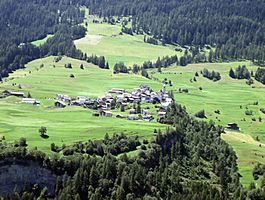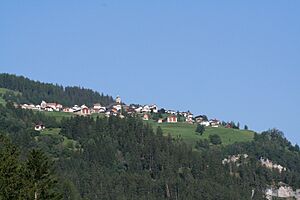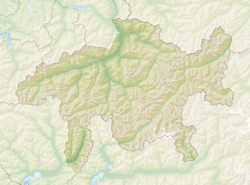Stierva facts for kids
Quick facts for kids
Stierva
|
||
|---|---|---|
 |
||
|
||
| Country | Switzerland | |
| Canton | Graubünden | |
| District | Albula | |
| Area | ||
| • Total | 10.54 km2 (4.07 sq mi) | |
| Elevation | 1,375 m (4,511 ft) | |
| Population
(Dec 2013)
|
||
| • Total | 134 | |
| • Density | 12.71/km2 (32.93/sq mi) | |
| Postal code |
7459
|
|
| Surrounded by | Alvaschein, Mon, Mutten, Salouf, Tiefencastel, Vaz/Obervaz, Zillis-Reischen | |
Stierva was once a small town, or "municipality," located in the Graubünden area of Switzerland. It was part of the Albula district.
On January 1, 2015, Stierva joined with several other towns. These included Alvaschein, Mon, Tiefencastel, Alvaneu, Brienz/Brinzauls, and Surava. They all merged to create a new, larger municipality called Albula/Alvra.
Back in 2000, most people in Stierva spoke Romansh as their main language. About two-thirds of the population used it. Most of the remaining people spoke German.
History of Stierva
When Stierva Was First Known
Stierva is a very old place. It was first mentioned in records way back in the year 841. At that time, its name was written as Seturiuo.
Changing the Name
For many years, until 1943, Stierva was known by a different name. It was called Stürvis. Then, the name was officially changed to Stierva.
Geography of Stierva
Where Stierva Is Located

Before it merged with other towns, Stierva covered an area of about 10.5 square kilometers (about 4 square miles). This is roughly the size of 1,500 football fields!
How the Land Was Used
A large part of Stierva's land, almost half (49.3%), was used for farming. Forests covered a big section too, about 42.1% of the area. Only a small part (1.8%) had buildings or roads. The rest of the land (6.7%) was made up of things like rivers or mountains, which are not used for farming or building.
The Village Layout
Stierva is located in a sub-district called Alvaschein, within the Albula district. The village itself is built in a special way. It's called a haufendorf. This means it's an unplanned village with buildings packed closely together around a central area. It sits above the lower Albula valley.
Population and People of Stierva
How Many People Lived There
As of 2013, Stierva had a population of 134 people. A small number of these residents (1.5% in 2008) were people from other countries. Over the ten years before 2013, the number of people living in Stierva slowly went down by about 5.8%.
Languages Spoken
In 2000, most people in Stierva spoke Rhaeto-Romance. This was about 66.4% of the population. The second most common language was German, spoken by 32.8% of the people. A very small number, 0.8%, spoke Italian.
Age Groups in Stierva
In 2000, the population of Stierva was almost evenly split between males and females. About 46.6% were male and 53.4% were female.
Here's how the ages were spread out in 2000:
- Young children (0-9 years old): 15.6% of the population (20 people).
- Pre-teens (10-14 years old): 4.7% (6 people).
- Young adults (20-29 years old): 13.3% (17 people).
- Adults (30-39 years old): 16.4% (21 people).
- Middle-aged adults (40-49 years old): 11.7% (15 people).
- Older adults (50-59 years old): 9.4% (12 people).
- Seniors (60-69 years old): 10.2% (13 people).
- Older seniors (70-79 years old): 12.5% (16 people).
- Very old seniors (80-89 years old): 5.5% (7 people).
- The oldest residents (90-99 years old): 0.8% (1 person).
Voting and Politics
In the 2007 Swiss federal election, the most popular political party in Stierva was the CVP. They received 45.2% of the votes. The next most popular parties were the SVP (40.6%), the SPS (7.8%), and the FDP (5.9%).
Education and Jobs
Many adults in Stierva (about 66.7% of those aged 25-64) had completed higher education. This means they went to a university or a specialized college after high school.
Stierva had a very low unemployment rate, at 0%. This means everyone who wanted a job had one.
In 2005, people in Stierva worked in different types of jobs:
- Primary sector: 21 people worked in jobs like farming or forestry. There were 11 businesses in this area.
- Secondary sector: 6 people worked in jobs like manufacturing or construction. There were 2 businesses in this area.
- Tertiary sector: 7 people worked in service jobs, like shops or tourism. There were 4 businesses in this area.
Historical Population Numbers
This table shows how the population of Stierva changed over many years:
| year | population |
|---|---|
| 1850 | 179 |
| 1900 | 150 |
| 1950 | 150 |
| 1960 | 130 |
| 1970 | 114 |
| 1980 | 113 |
| 1990 | 100 |
| 2000 | 137 |
| 2010 | 140 |
See also
 In Spanish: Stierva para niños
In Spanish: Stierva para niños
 | John T. Biggers |
 | Thomas Blackshear |
 | Mark Bradford |
 | Beverly Buchanan |




